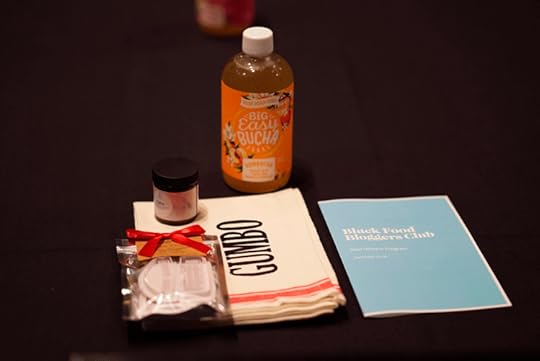5 Tips for Hosting a Food Blogging Retreat
 A guest post by Jasmine Lukuku
A guest post by Jasmine Lukuku
A few years ago, I felt restless about blogging. I’d poured a lot of time into developing a niche community for Black Food Bloggers Club on Facebook. The group had grown organically, but I was eager to connect with members face-to-face at a blogging retreat.
After polling the group to gauge interest, I decided to host a blogging retreat in New Orleans. We would spend mornings improving our blogging skills and evenings exploring the city. I wanted professional development with a healthy dose of fun.
I’d never planned a retreat before, but I knew I could pull it off. I set a personal goal of 15 attendees. That was the size of group I felt I could comfortably manage as a solo organizer.
I believe that once you get the right group of people together with a well-crafted itinerary, everyone will have a good time. And we had an amazing time. Attendees learned valuable blogging skills while building real-life friendships with their blogging peers. I fell short of my attendance goals due to a couple of last minute cancellations. But I secured an event sponsor to help offset the costs.
The blogging retreat was exactly what I needed to feel reconnected to my work and my online community.
If you want to host your own niche food blogging retreat, here are 5 tips for a successful event:
1. Give yourself more time than you think you need.
A great retreat that must be planned well in advance. Your dream hotel might fill up if you don’t put a deposit down in advance. That perfect guest speaker might book another gig. That ideal corporate partner might run out of sponsorship dollars. Avoid disappointment by giving yourself plenty of runway.
The earlier you book your hotels, venues, caterers, speakers and other vendors — the more room you have to negotiate fees. Plus, your attendees will need time to save for the trip, secure affordable flights and book vacation days with their employers. They will appreciate the long lead time.
I recommend 6-9 months for smaller, local or domestic retreats. If your event is large, or requires international travel, give yourself 9-12 months.
2. Connect with the local tourism boards and businesses that are aligned with your vision.
Local tourism boards are a gold mine of information and resources for the retreat organizer. If you’ve never been to the city where you are hosting your retreat, they can help you navigate the city and make sure you get the most out of your stay.
When I decided to host the blogging retreat in New Orleans, my first step was to reach out to the city’s official tourism and convention bureau. The bureau connected me directly with a selection of hotels suitable for a small group. I secured an affordable group rate at a stylish hotel without having to spend hours researching options.

Welcome gifts and program for the first Black Food Bloggers Club retreat in New Orleans.
Local tourism boards can connect you with local businesses and institutions aligned with your retreat vision and values. I also connected with local businesses to get welcome gifts for attendees. Some companies offered free product for gift bags, while others offered group discounts on events. It all helped me keep costs down while adding value to the retreat.
3. Give attendees plenty of downtime.
As you plan your itinerary, you will be tempted to fill every hour of the day with irresistible activities. This is a mistake. A well-crafted itinerary should include plenty of down time. Some people will want to explore the city on their own, others may want to nap or spend some quiet time at the pool. Give people space to recharge between activities.
I scheduled my retreat days so that every day had a 2-hour break in the middle. This was enough time for people to grab lunch and refresh before our afternoon workshops and events. I also left the evenings unscripted to leave room for spontaneity. It is in these unplanned hours that magic happens and attendees form authentic connections.
4. Factor in inclusivity and accessibility.
Every person who attends your retreat deserves to be treated with respect. This is a non-negotiable rule that you and all of your attendees should acknowledge BEFORE they attend the event.
I recommend that you ask all your attendees to agree to a code of conduct when they register. This doesn’t have to be a long, formal contract. It can be a simple statement on your event webpage that says something like this: “I understand that this is an inclusive event with a diverse group of attendees. I agree to treat all attendees with respect.”
Lead by example by reaching out to your attendees and asking them if they need any special accommodation. Some attendees may have dietary restrictions, while others may need special seating or help with mobility issues. Make sure that your itinerary considers these needs.
Also consider financial accessibility. Offering a needs-based scholarship to one or more attendees is a great way to practice inclusivity. Even partial scholarships or reduced registration fees can help. Try to bake this right into your planned event budget.
5. Under promise and over deliver. Don’t end up like Fyre Fest!
Do you remember Fyre Fest? The organizers promised luxury accommodations, world-class entertainment and lavish meals. The attendees ended up fighting over tents, toilet paper, and plain cheese sandwiches.
Fyre Fest is an extreme example of what happens when organizers promises more than they can deliver. You can avoid this mistake by keeping it real.
Be honest about the scale of your retreat in all of your promotional materials. You don’t have to outline every detail of the event in advance but you can provide a sample itinerary of each day’s activities. Specify which meals and events are included with the registration fee. This information allows attendees to budget and plan for extracurricular activities during the trip.

An outing to Joy the Baker’s workshop space, the Bakehouse, where she demonstrated her cake design process and photo stying for her popular Drake on Cake Instagram page.
When you write your sample itinerary, be cautious about dropping names or specific details that you haven’t locked down. Don’t advertise those amazing speaker you have lined up until you are 100% sure they will be there.
If this is your first event, don’t be afraid to go small. A cozy group of bloggers exploring a city together can be just as rewarding as a blowout conference event. You can always increase your attendance and offerings in the years to come.
* * *
Jasmine Lukuku is a brand strategist based in Vancouver, British Columbia. She is co-owner of RXVP, a creative agency that works with small and mid-size businesses in the food, lifestyle and non-profit sectors. She is also a member of the Food Blogger Pro team where she works as an affiliate program manager and graphic designer. In 2017, she founded the Black Food Bloggers Club to help amplify underrepresented voices.
The post 5 Tips for Hosting a Food Blogging Retreat appeared first on Dianne Jacob, Will Write For Food.



